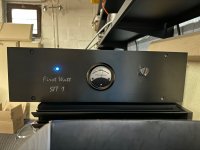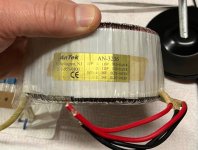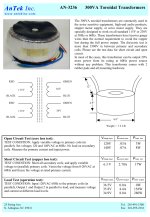I'll give you procedure tonight how to set that
in a meantime, listen...... all day long, as it is
in a meantime, listen...... all day long, as it is
It can be a wise idea to not solder the transformers wires straight to the PCB but to use screw connectors by Phoenix. That way the boards don’t suffer and you can replace/rewire more easily in case the transformers do need to be replaced. The electrolytic caps are 100V rated.
no need for that, it's good enough as is
Much appreciatedI'll give you procedure tonight how to set that
in a meantime, listen...... all day long, as it is
I don’t agree. Soldering solid copper mains voltage carrying wires of external parts like transformers primaries straight to boards is not standard in todays electronics. Also not with mains wiring itself. This is normally crimped/screwed for a few reasons.
Good enough maybe but not most sturdy.
Good enough maybe but not most sturdy.
Last edited:
I have been in touch with a SIT1 owner who has confirmed the US model uses the AN3236 115+115V -> 36+36V.
I ran the amps for a few hours and they got crazy hot (definitely did not pass the 3-second touch rule).
I guess I better swap out these transformers to 36v? This likely will also put the bias needle in the center of the display with the adjustable dial at the middle position.
I ran the amps for a few hours and they got crazy hot (definitely did not pass the 3-second touch rule).
I guess I better swap out these transformers to 36v? This likely will also put the bias needle in the center of the display with the adjustable dial at the middle position.
Attachments
do not even think of replacing something, when there is no need for that
re-read my posts above;
SIT 1 rail is in range of 90Vdc, so you have fully functional amp, needing slight tweak of one trimpot inside
build Babysitter for each monoblock
re-read my posts above;
SIT 1 rail is in range of 90Vdc, so you have fully functional amp, needing slight tweak of one trimpot inside
build Babysitter for each monoblock
and you don't even need to think about secondaries .............. 90Vac is proper arrangement, btw.
typo from my side, while thinking about 90Vdc rail
meant to be " 72Vac is proper arrangement, btw."
Wait.... so, then in the end you are agreeing with me? SIT1 rail requirement is 90Vdc. This requires 72Vac. So, 36+36V secondaries.
I just measured the amp with 45+45v secondaries (theoretically 90Vac = 117Vdc) that has been running for a few hours now. Measured: V+ = 103.5v, V- = 9.5v (113Vdc). This is too high. This is why the needle is above the center point even with the dial at the full CCW position?
I have pulled the power cords for now....
I just measured the amp with 45+45v secondaries (theoretically 90Vac = 117Vdc) that has been running for a few hours now. Measured: V+ = 103.5v, V- = 9.5v (113Vdc). This is too high. This is why the needle is above the center point even with the dial at the full CCW position?
I have pulled the power cords for now....
yeah, re-reading and looking again at pics ..........
to recapitulate:
US amp is having 36Vac + 36Vac secs, connected in series, ending in 72Vac; your pic of original US Donut is confirmed by pics I have from other source, showing same numbers
to split a hair, Donut with 115Vac primary, nowadays mains in US is 120Vac, ending in 72Vac*120/115=75Vac
Japanese amp is having 45Vac+45Vac secs, primary 115Vac on 100Vac mains, thus ending in (90*(100/115))Vac=78Vac effectively
difference between 75Vac and 78Vac is irrelevant
now, as is, you'll need to order pair of new Donuts
300VA, 230Vac primary, 75Vac secondary; or - if lookiing for ready made/standard values, you can search for 36+36Vac, and connect it in series
sorry, I wasn't careful enough from start, or I would spot 45 vs 36 difference from the start ......... brainfart, due to thinking about ending 90Vdc main rail (when effective negative rail in circuit is subtracted from full PSU voltage)
to recapitulate:
US amp is having 36Vac + 36Vac secs, connected in series, ending in 72Vac; your pic of original US Donut is confirmed by pics I have from other source, showing same numbers
to split a hair, Donut with 115Vac primary, nowadays mains in US is 120Vac, ending in 72Vac*120/115=75Vac
Japanese amp is having 45Vac+45Vac secs, primary 115Vac on 100Vac mains, thus ending in (90*(100/115))Vac=78Vac effectively
difference between 75Vac and 78Vac is irrelevant
now, as is, you'll need to order pair of new Donuts
300VA, 230Vac primary, 75Vac secondary; or - if lookiing for ready made/standard values, you can search for 36+36Vac, and connect it in series
sorry, I wasn't careful enough from start, or I would spot 45 vs 36 difference from the start ......... brainfart, due to thinking about ending 90Vdc main rail (when effective negative rail in circuit is subtracted from full PSU voltage)
I measured: V+ = +103.5v, V- = -9.5v (113Vdc) on the amp channel. Bias current I did not measure. I’ll re-power the amps only once I have the new 36+36v transformers in.
So as expected in effect you need 2 new transformers. It was maybe not a wise choice to have them powered on just like that. Since the mains voltage in the EU is seemingly always above 240V and the regulations already allow for a maximum of 253V and possibly in the future even 264V for a maximum of 10 minutes (this is very unwanted but it is requested) because of solar and wind energy you do a very good choice by choosing 240V (2 x 120V) primary/2 x 35V secondary voltage versions. These are available at some brands. Measure the mains voltage in your home to check. Some toroids are sensitive to higher mains voltage and then hum.
Although I hold ZM in high esteem, he forgot to add the same margin to a 230V calculation with actual 240V (or 25xV) in reality.
It is just a tip. I see or better said hear too many humming toroids even by A brands.
Although I hold ZM in high esteem, he forgot to add the same margin to a 230V calculation with actual 240V (or 25xV) in reality.
It is just a tip. I see or better said hear too many humming toroids even by A brands.
Last edited:
ZM is much greater Chicken than Pa, in general and in every particular case
This time, I'm not disputing his logic, counting that US mains is having more or less same fluctuations as we have on this side of Big Pond
anyhow, this time all blame is on me, didn't catch evidently shown 45Vac secs in existing amps
This time, I'm not disputing his logic, counting that US mains is having more or less same fluctuations as we have on this side of Big Pond
anyhow, this time all blame is on me, didn't catch evidently shown 45Vac secs in existing amps
Papa may be 1 step ahead here? See bottom right spec of the AN-3236 datasheet.So as expected in effect you need 2 new transformers. It was maybe not a wise choice to have them powered on just like that. Since the mains voltage in the EU is seemingly always above 240V and the regulations already allow for a maximum of 253V and possibly in the future even 264V for a maximum of 10 minutes (this is very unwanted but it is requested) because of solar and wind energy you do a very good choice by choosing 240V (2 x 120V) primary/2 x 35V secondary voltage versions. These are available at some brands. Measure the mains voltage in your home to check. Some toroids are sensitive to higher mains voltage and then hum.
Although I hold ZM in high esteem, he forgot to add the same margin to a 230V calculation with actual 240V (or 25xV) in reality.
It is just a tip. I see or better said hear too many humming toroids even by A brands.
Attachments
- Home
- Amplifiers
- Pass Labs
- Japanese 100V First Watt amps - run at 240V



